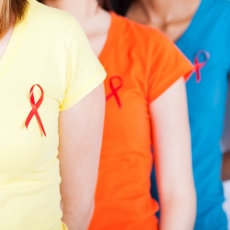

National Institutes of Health
Other Languages
 |
Women and HIV
HIV is the virus that causes AIDS. HIV often spreads through unprotected sex with an infected person. Women can get it more easily during vaginal sex than men can. HIV may also spread by sharing drug needles or through contact with the blood of an infected person. Learn more about HIV/AIDS in women, prevention and available treatments.
HIV stands for human immunodeficiency virus. It harms your immune system by destroying the white blood cells that fight infection. AIDS stands for acquired immunodeficiency syndrome. It is the final stage of infection with HIV. Not everyone with HIV develops AIDS.
HIV often spreads through unprotected sex with an infected person. Women can get it more easily during vaginal sex than men can. HIV may also spread by sharing drug needles or through contact with the blood of an infected person.
About one in four people in the United States who have HIV are women. Women who have HIV/AIDS have some different problems from men, such as
- Complications such as repeated vaginal yeast infections, severe pelvic inflammatory disease(PID), and a higher risk of cervical cancer
- Different, sometimes more severe, side effects from the drugs that treat HIV/AIDS
- Drug interactions between some HIV/AIDS medicines and hormonal birth control
- The risk of giving HIV to their baby while pregnant or during childbirth
- Women often don't get diagnosed until they are in the later in the stages of HIV infection. This means that they may be more at risk of infections.
- Get Tested for HIV (Department of Health and Human Services, Office on Women's Health)Also in Spanish
- Top Questions About HIV Prevention and Women(Department of Health and Human Services, Office on Women's Health)
- HIV/AIDS and Pregnancy: MedlinePlus Health Topic
 (National Library of Medicine)Also in Spanish
(National Library of Medicine)Also in Spanish
- HIV among Women (Centers for Disease Control and Prevention)
- Intersection of Intimate Partner Violence and HIV in Women(Centers for Disease Control and Prevention) - PDF
- ClinicalTrials.gov: HIV/AIDS in Women
 (National Institutes of Health)
(National Institutes of Health)
- AIDSinfo
 (Department of Health and Human Services)Also in Spanish
(Department of Health and Human Services)Also in Spanish - HIV.gov (AIDS.gov)
- NIAID Division of AIDS
 (National Institute of Allergy and Infectious Diseases)
(National Institute of Allergy and Infectious Diseases)
No comments:
Post a Comment